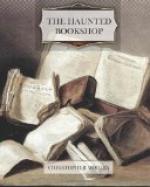“Your argument is a whole succession of non sequiturs,” said Jerry, stimulated by the cider to unusual brilliance.
“That’s a long putt,” chuckled Benson, the dealer in rare books and first editions.
“What I mean is this,” said Jerry. “We aren’t literary critics. It’s none of our business to say what’s good and what isn’t. Our job is simply to supply the public with the books it wants when it wants them. How it comes to want the books it does is no concern of ours.”
“You’re the guy that calls bookselling the worst business in the world,” said Roger warmly, “and you’re the kind of guy that makes it so. I suppose you would say that it is no concern of the bookseller to try to increase the public appetite for books?”
“Appetite is too strong a word,” said Jerry. “As far as books are concerned the public is barely able to sit up and take a little liquid nourishment. Solid foods don’t interest it. If you try to cram roast beef down the gullet of an invalid you’ll kill him. Let the public alone, and thank God when it comes round to amputate any of its hard-earned cash.”
“Well, take it on the lowest basis,” said Roger. “I haven’t any facts to go upon——”
“You never have,” interjected Jerry.
“But I’d like to bet that the Trade has made more money out of Bryce’s American Commonwealth than it ever did out of all Parson Wright’s books put together.”
“What of it? Why shouldn’t they make both?”
This preliminary tilt was interrupted by the arrival of two more visitors, and Roger handed round mugs of cider, pointed to the cake and the basket of pretzels, and lit his corn-cob pipe. The new arrivals were Quincy and Fruehling; the former a clerk in the book department of a vast drygoods store, the latter the owner of a bookshop in the Hebrew quarter of Grand Street— one of the best-stocked shops in the city, though little known to uptown book-lovers.
“Well,” said Fruehling, his bright dark eyes sparkling above richly tinted cheek-bones and bushy beard, “what’s the argument?”
“The usual one,” said Gladfist, grinning, “Mifflin confusing merchandise with metaphysics.”
Mifflin—Not at all. I am simply saying that it is good business to sell only the best.
Gladfist—Wrong again. You must select your stock according to your customers. Ask Quincy here. Would there be any sense in his loading up his shelves with Maeterlinck and Shaw when the department-store trade wants Eleanor Porter and the Tarzan stuff? Does a country grocer carry the same cigars that are listed on the wine card of a Fifth Avenue hotel? Of course not. He gets in the cigars that his trade enjoys and is accustomed to. Bookselling must obey the ordinary rules of commerce.
Mifflin—A fig for the ordinary rules of commerce! I came over here to Gissing Street to get away from them. My mind would blow out its fuses if I had to abide by the dirty little considerations of supply and demand. As far as I am concerned, supply creates demand.




